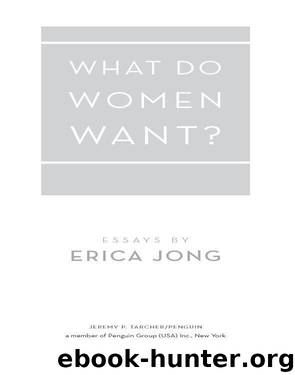What Do Women Want? by Erica Jong

Author:Erica Jong
Language: eng
Format: epub
Publisher: Penguin USA, Inc.
If Nin was such a pivotal and important figure in the history of modern literature, why has she been so maligned?
The first reason is obvious: sexism. The second is also obvious: our unique cultural fear of sexuality. The third reason is equally obvious: What she has created is new (a kind of writing that hybridizes autobiography and fiction). Since we belong to a species that fears the new for no other reason than because it is not old, Nin’s creation of a new form is troubling.
But Nin has also been deeply misunderstood because of the sequence in which her work appeared.
For years she was the great unpublished author, whispered and gossiped about, known for her literary love affairs and vast artistic and psychoanalytic acquaintanceship. The few novels that appeared under her name were written in an obfuscating experimental style and issued from precious avant-garde publishers. Even her book on D. H. Lawrence was known only to a coterie.
In the early seventies, with the rebirth of feminism, the so-called second wave, Nin was published to a large hungering audience, but published in ways that obscured the immensity of her achievement. The books were expurgated to spare the feelings of husband Hugo and countless others who were still alive.
Nin’s reputation rose with feminism and fell with its repudiation. It rose with the movement for sexual liberation and fell when that movement retreated in the Reagan-Thatcher-Bush years.
Now, in the age of AIDS panic, uncut Nin journals are gradually reappearing. But Nin is out of fashion as a contemporary feminist, because the political winds have shifted. She is a seductress in a time when all seduction is presumed to be rape, a sensitive chronicler of inner emotion and psychoanalytic transformation when all that is wanted from women writers is angry agitprop which repudiates Freud and all “dead white males.”
But the largeness of her contribution will remain for other times, other politics. Like Colette, she told the inner story of a woman’s life from girlhood to old age. She committed neither suicide nor creative suicide. She was indefatigable (as every artist must be), and she left a body of work that other women writers can build upon. We can love her or hate her. Either emotion will be useful for our future writing. But she is there like a mountain. She must be climbed.
There are signs that as this century ends, her innovations have become part of our literature. The incest taboo has been broken. Autobiography and fiction have been merged into one form. Women writers have a degree of freedom undreamed of by her generation. And the unexpurgated journals will keep on coming. They will continue to be attacked by women who are afraid of freedom and by men who like women that way. But for our daughters and granddaughters, they will be there. When tomorrow’s women are ready, they will read Anaïs Nin and be transformed.
Future generations will discover her with the excitement we felt when we discovered Virginia Woolf, Colette, Simone de Beauvoir, Edna St.
Download
This site does not store any files on its server. We only index and link to content provided by other sites. Please contact the content providers to delete copyright contents if any and email us, we'll remove relevant links or contents immediately.
4 3 2 1: A Novel by Paul Auster(12371)
The handmaid's tale by Margaret Atwood(7755)
Giovanni's Room by James Baldwin(7322)
Asking the Right Questions: A Guide to Critical Thinking by M. Neil Browne & Stuart M. Keeley(5757)
Big Magic: Creative Living Beyond Fear by Elizabeth Gilbert(5754)
Ego Is the Enemy by Ryan Holiday(5413)
The Body: A Guide for Occupants by Bill Bryson(5079)
On Writing A Memoir of the Craft by Stephen King(4928)
Ken Follett - World without end by Ken Follett(4722)
Adulting by Kelly Williams Brown(4564)
Bluets by Maggie Nelson(4547)
Eat That Frog! by Brian Tracy(4524)
Guilty Pleasures by Laurell K Hamilton(4439)
The Poetry of Pablo Neruda by Pablo Neruda(4097)
Alive: The Story of the Andes Survivors by Piers Paul Read(4017)
White Noise - A Novel by Don DeLillo(4001)
Fingerprints of the Gods by Graham Hancock(3991)
The Book of Joy by Dalai Lama(3972)
The Bookshop by Penelope Fitzgerald(3843)
